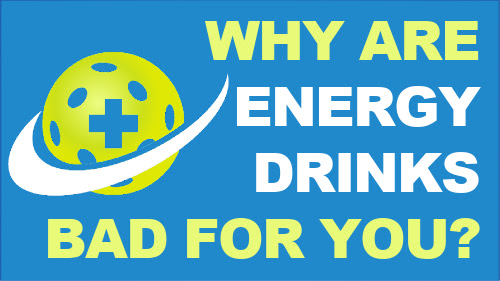Introduction
I once had someone tell me the secret to them starting their tournament day was a can of Monster energy drink. I’m not one to judge; I start the day with two cups of coffee plus MCT oil. However, seemingly harmless energy drinks are not as helpful, or even safe, as they seem. Several studies have linked energy drinks to negative side effects and health risks, including trips to the emergency room. They also contain high amounts of caffeine and sugar, which, if consumed in large doses, can have unhealthy repercussions. It’s important to be aware of the risks that come with regularly drinking energy drinks and keep consumption within a healthy limit.
The Hidden Ingredients in Energy Drinks
Aside from the high sugar content in most energy drinks, there are several other ingredients of which consumers should be aware. It’s not that any one of these ingredients by themselves are the issue. It’s that they are often combined and it’s hard to measure how much of each is being consumed.
First, many energy drinks contain guarana. This ingredient contains two-three times more caffeine than coffee beans, so consuming too much of it can lead to increased heart rate and jittery feelings. Guarana is also known to raise blood pressure, which can be dangerous to those with preexisting conditions.
Energy drinks also often contain taurine. This is an amino acid found in animal tissue, and it is believed to have diuretic properties. Thought to be generally safe to consume, it can have an adverse effect on those with diabetes or heart disease.
Another hidden ingredient is yerba mate. This tea is native to South America and is known to have stimulant qualities. Yerba mate can increase alertness and focus, but it also raises heart rate, blood pressure, and body temperature – creating potential hazards for those with conditions such as anxiety, depression, or hypertension.
Lastly, many energy drinks contain ginseng. This plant has been used in traditional medicine for centuries, and although its effects remain unproven, it can contribute to feelings of increased energy. Unfortunately, ginseng has also been linked to increased anxiety levels, palpitations, and insomnia.
The Effects of Energy Drinks On Your Body
Let’s not sugar coat this (pun intended)… here are the risks:
1. Energy Drinks Contain High Levels of Caffeine: Caffeine is a stimulant which amplifies your energy levels, but excessive amounts can cause jitters, irritability, insomnia, and even headaches. Many energy drinks contain significantly higher amounts of caffeine than regular coffee – up to three times the amount.
2. Stimulants Can Raise Blood Pressure and Increase Heart Rate: Stimulants like caffeine and taurine can increase your heart rate and cause systolic blood pressure to rise. This is due to increased stress hormones like cortisol and epinephrine, which in large amounts can be dangerous for those with existing heart problems.
3. Energy Drinks are High in Sugar: Many energy drinks contain high levels of sugar, which can contribute to diabetes, obesity and other health problems. Not to mention, too much sugar can lead to a crash in energy levels, worsened mental fatigue and increased anxiety.
4. Artificial Sweeteners May Harm Your Health: Some energy drinks contain artificial sweeteners like aspartame, sucralose and acesulfame-potassium (ACE). These can be harmful to your health, causing dehydration and headaches, as well as triggering diseases such as diabetes and cancer.
Alternatives to Energy Drinks
If you’re looking for a more natural and healthy way to get an energy boost, there are several alternatives. One option is to consume food that contains natural energy-boosting ingredients. Foods such as nuts, grains, and legumes are packed with vitamins and minerals that can provide you with the energy you need without the added sugar, caffeine, etc. This is especially helpful on tournament days when you may not have the time to stop for a full meal, but need to keep fueling.
Another option is to increase your physical activity. Physical activity can help to improve energy, mood, cardiovascular health, and overall wellbeing. So when you are NOT on the court, get up and move your body every hour. Set a timer if you need to. If you combine this with drinking more water (see this post as to why THAT’s a good idea), you’ll need to get up for a ‘bio-break’ more often anyway. See? Two for one!
If you need to supplement energy during long rec play or on tournament days, consider the products from Gu Energy Labs. They are all natural, healthy, and designed specifically for endurance sports. Yes, 8 hour tournament days and even 3 hour rec days (depending on the level of play) burn enough calories to be considered endurance activities.
Finally, one of the most important things you can do is to make sure you are getting enough restful sleep. Most people are chronically sleep deprived, but sleeping well is essential for having sustained energy throughout the day. Incorporating healthy sleeping habits and routines can help to reduce the amount of energy drinks needed to get through the day. Check out episode 8 with “The Sleep Doctor” himself, Dr. Michael Breus, for strategies if you struggle.
Conclusion
Energy drinks are becoming increasingly popular, but unfortunately, can wreak havoc on health. High levels of sugar and caffeine can have a multitude of adverse effects when consumed regularly. Ingesting energy drinks on a regular basis can lead to increased blood pressure, possible addiction, insomnia, cardiac problems, and dehydration.
Consuming energy drinks should only be done in moderation. If you need an occasional energy boost, consider the alternatives above. Don’t let your reliance on energy drinks become the new norm or else your body and health may suffer long term. Be mindful of your energy drink consumption and take steps to ensure your health remains optimal.
Play on!

